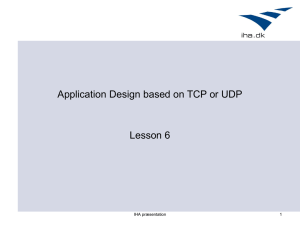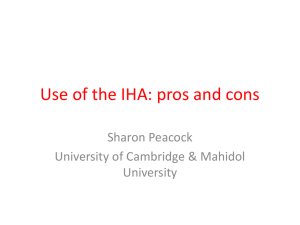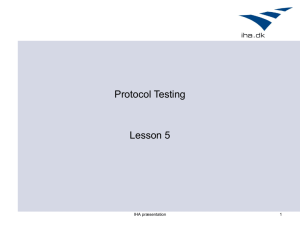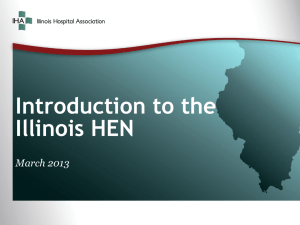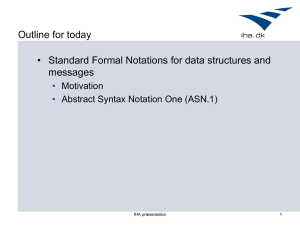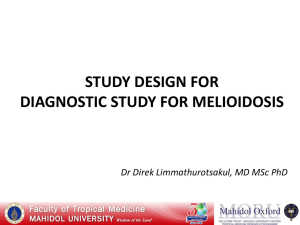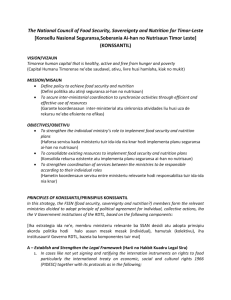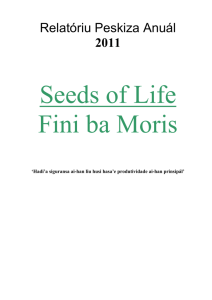Text Based Protocols
advertisement
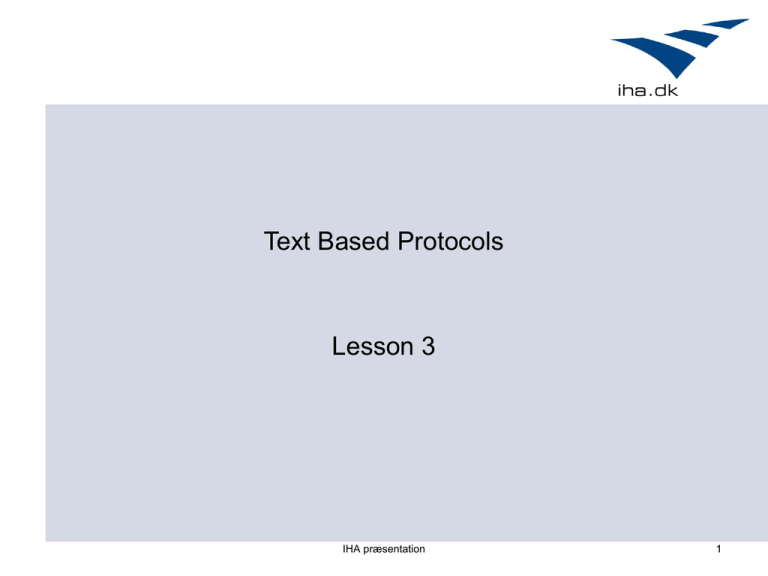
Text Based Protocols
Lesson 3
IHA præsentation
1
Outline for today
• Text Based Protocols
• Augmented Backus-Naur (ABNF)
• Motivation
• The Language
• Usage
• Text-based vs. Binary encoding
IHA præsentation
2
Augmented Backus-Naur Form
• A metalanguage
• Based on Backus-Naur Form
• Describes a formal system of a language to be used as
a bidirectional communication protocol
• Many variants of Backus-Naur
• Extended (EBNF)
• Augmented (ABNF)
IHA præsentation
3
Augmented Backus-Naur Format
The Language
IHA præsentation
4
ABNF – Text-based Syntax
An ABNF Specification is a set of derivation rules.
A rule is defined by the following sequence:
name = elements CR LF
name of the rule
one or more rule names
separates the name from the definition of the rule
Rules resolve into a string of terminal values, sometimes called characters
IHA præsentation
5
ABNF – Text-based Syntax
Example
rulename = “abc”
ABNF strings are case insensitive. Hence:
rulename = “abc”
and
rulename = “aBc”
will match “Abc”, abC”, ABc”…………
IHA præsentation
6
ABNF – Operators
Concatenation: Rule1 Rule2
A rule may be defined by listing a sequence of rule names. For example:
foo = %x61
;a
bar = %x62
;b
A semicolon starts a comment that continues to the end of line
mumble = foo bar foo
The rule <mumble> matches the lowercase string “aba”
individually specified character – makes the rule case sensitive
IHA præsentation
7
ABNF – Operators
Alternatives: Rule1 / Rule2
A rule may be defined by a list of alternative rules by a forward slash (“/”):
foo / bar
will accept <foo> or <bar>
Value Range Alternatives: %c##-##
A range of alternative numeric values can be specified compactly using a dash
(”-”) to indicate the range of alternative values
DIGIT
= %x30-39
IHA præsentation
8
ABNF – Operators
Incremental Alternatives: Rule1 =/ Rule2
Additional alternatives may be added to a rule through the use of =/ s that the
ruleset:
ruleset = alt1 / alt2
ruleset =/ alt3
ruleset =/ alt4 / alt5
is the same as specifying
ruleset = alt1 / alt2 / alt3 / alt4 / alt5
IHA præsentation
9
ABNF – Operators
Sequence Group: (Rule1 Rule2)
Elements enclosed in parentheses are treated as a single element. Thus,
elem (foo / bar) blat
matches (elem foo blat) or (elem bar blat), and
elem foo / bar blat
matches (elem foo) or (bar blat)
IHA præsentation
10
ABNF – Operators
Variable Repetition: *Rule
The operator “*” preceding an element indicates repetition. The full form is:
<a>*<b>element
where <a> and <b> are optional decimal values, indicating at least <a> and at
most <b> occurrences of the element
Specific Repetition: nRule
A rule of the form:
<n>element
is equivalent to
<n>*<n>element
IHA præsentation
11
ABNF – Operators
Examples - Variable Repetition: *Rule
Default values are 0 and infinity so that
*<element> allows any number, including zero
1*<element> requires at least one
3*3<element> allows exactly 3
1*2<element> allows one or two.
Example - Specific Repetition: nRule
2DIGIT is a 2-digit
3ALPHA is a string of three alphabetic characters
IHA præsentation
12
ABNF – Operators
Optional Sequence: [Rule]
Square brackets enclose an optional element sequence:
[foo bar]
is equivalent to:
*1(foo bar)
IHA præsentation
13
ABNF – Operators
Operator Precedence
1. Rule name, prose-val, Terminal value
2. Comment
3. Value Range
4. Repetition
5. Grouping, Optional
6. Concatenation
7. Alternative
IHA præsentation
14
ABNF – Example (from wikipedia)
postal-address = name-part street zip-part
name-part = *(personal-part SP) last-name [SP suffix] CRLF
name-part =/ personal-part CRLF
personal-part = first-name / (initial ".")
first-name = *ALPHA
initial = ALPHA
last-name = *ALPHA
suffix = ("Jr." / "Sr." / 1*("I" / "V" / "X"))
street = [apt SP] house-num SP street-name CRLF
apt = 1*4DIGIT
house-num = 1*8(DIGIT / ALPHA)
street-name = 1*VCHAR
zip-part = town-name "," SP state 1*2SP zip-code CRLF
town-name = 1*(ALPHA / SP)
state = 2ALPHA
zip-code = 5DIGIT ["-" 4DIGIT]
IHA præsentation
15
ABNF – Exercise 1
Write a grammar to accept the following input:
“I would like to fly from ___ to ___ (please/thanks)”
where the following cities are allowed:
“paris”, “new york”, “dublin”
and
“please” or “thanks” is an optional extra
IHA præsentation
16
ABNF - Excise 2
Specify, using ABNF, the syntax for a directory path, like
users/smith/file or
users/smith/WWW/file
with none, one or more directory names, followed by a file
name.
IHA præsentation
17
ABNF - Exercise 3
Specify the syntax of an e-mail header field with the following properties:
Name: .Weather.
Values: .Sunny. or .Cloudy. or .Raining. or .Snowing.
Optional parameters: ";" followed by parameter, "=" and integer value
Parameters: .temperature. and .humidity.
Examples:
Weather: Sunny; temperature=20; humidity=50
Weather: Cloudy
IHA præsentation
18
Augmented Backus-Naur Format
Usage
IHA præsentation
19
ABNF – Text-based Syntax
Usage:
-
HTTP
- Browsing the internet
-
Session Initiation Protocol
- VoIP (IP telephony), IMS (IP Multimedia Subsystem)
-
Session Description Protocol
IHA præsentation
20
ABNF (VoIP Example)
SIP
SIP
INVITE sip:e9-airport.mit.edu SIP/2.0
From: "Dennis Baron"<sip:6172531000@mit.edu>;tag=1c41
To: sip:e9-airport.mit.edu
Call-Id: call-1096504121-2@18.10.0.79
Cseq: 1 INVITE
Contact: "Dennis Baron"<sip:6172531000@18.10.0.79>
Content-Type: application/sdp
Via: SIP/2.0/UDP 18.10.0.79
200 OK
IHA præsentation
21
VoIP (SIP Session)
IHA præsentation
22
Session Initiation Protocol
SIP-message = Request / Response
Request =
Request-Line
*( message-header )
CRLF
[ message-body ]
Response = Status-Line
*( message-header )
CRLF
[ message-body ]
IHA præsentation
23
Session Initiation Protocol
Request-Line=Method SP Request-URI SP SIP-Version CRLF
Status-Line=SIP-Version SP Status-Code SP Reason-Phrase CRLF
Method= INVITEm / ACKm / OPTIONSm
/ BYEm / CANCELm / REGISTERm
/ INFOm / PRACKm / SUBSCRIBEm / NOTIFYm
/ UPDATEm / MESSAGEm / REFERm / PUBLISHm
/ extension-method
INVITEm=%x49.4E.56.49.54.45
; INVITE in caps
IHA præsentation
24
Text-based vs. Binary Encoding
IHA præsentation
25
Text-based vs. Binary Encoding
ABNF Specification
ASN.1 Specification
Family = "Family"
CRLF *(Person)
"End of Family"
Family = SEQUENCE OF Person
Person = "Person" CRLF
" Name: " 1*A CRLF
" Birthyear: " 4D CRLF
" Gender: "
("Male"/"Female") CRLF
" Status: "
("unmarried"/ "married"/
"divorced"/ "widow"/"widower" )
Person := SEQUENCE {
name VisibleString,
birthyear INTEGER,
gender Gender,
status Status }
Gender := ENUMERATED {
male(0), female(1) }
Status := ENUMERATED {
unmarried(0), married(1), divorced(2),
widow(3), widower(4) }
IHA præsentation
26
Text-based vs. Binary Encoding
Example of textual encoding
Example of BER encoding
Family
Person
Name: John Smith
Birthyear: 1958
Gender: Male
Status: Married
Person
Name: Eliza Tennyson
Birthyear: 1959
Gender: Female
Status: Married
End of Family
30 34
30 16
1A 0A J o h n S m i t h
02 02 07 A6
0A 01 00
0A 01 01
30 1A
1A 0E E l i z a T e n n y s o n
02 02 07 A7
0A 01 01
0A 01 01
169 octets (excl. new lines)
18% efficiency compared to ASN.1 PER
54 octets
57% efficiency compared to ASN.1 PER
IHA præsentation
27
Text-based vs. Binary Encoding
The PER (unaligned variant) encoding of the same ASN.1 and the same data would be the following 31 octets:
00000010 (no of persons in family)
000011 10 (14 characters)
00001010 (10 characters)
100010 1
E
1001010 J
1101100
l
1 101111 o
1101001 i
11 01000 h
1 111010
z
110 1110 n
11 00001
a
0100 000
010 0000
10100 11 S
1010 100 T
110110 1 m
11001 01
e
1101001
i
110111 0
n
1110100
t
1101110
n
1 101000
h
1111001
y
00 000010 (2 octest)
1 110011
s
00 0011110 100110 (1958)
11 01111
o
0
(male)
110 1110
n
0 01
(married)
0000 0010 (2 bytes)
0000 01111010 0111 (1959)
1
(female)
001
(married)
IHA præsentation
28
